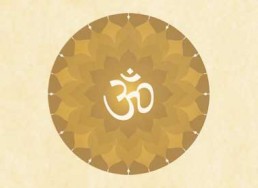Bhadram Karne
ॐ भद्रं कर्णेभिः शृणुयाम देवाः ।
भद्रं पश्येमाक्षभिर्यजत्राः ।
स्थिरैरङ्गैस्तुष्टुवागँसस्तनूभिः ।
व्यशेम देवहितं यदायूः ।
स्वस्ति न इन्द्रो वृद्धश्रवाः ।
स्वस्ति नः पूषा विश्ववेदाः ।
स्वस्ति नस्ताक्षर्यो अरिष्टनेमिः ।
स्वस्ति नो वृहस्पतिर्दधातु ॥
ॐ शान्तिः शान्तिः शान्तिः ॥
oṃ bhadraṃ karṇebhiḥ śṛṇuyāma devāḥ .
bhadraṃ paśyemākṣabhiryajatrāḥ .
sthirair aṅgais tuṣṭuvāgam̐sas tanūbhiḥ .
vyaśema devahitaṃ yadāyūḥ .
svasti na indro vṛddhaśravāḥ .
svasti naḥ pūṣā viśvavedāḥ .
svasti nastākṣaryo ariṣṭanemiḥ .
svasti no vṛhaspatirdadhātu ..
oṃ śāntiḥ śāntiḥ śāntiḥ ..
O devas, may we (always/only) hear what is auspicious with our ears,
O gods/worthy of sacrifice, may we (always/only) see what is auspicious with our eyes;
O gods/who are praised, may we reach/attain with steady limbs and bodies the life(span) that has been established by the gods.
May Indra (of) exalted fame give us well being;
May the omniscient Pūṣā give us well being;
May Tārkṣya of indestructible wheel rims give us well being;
May Bṛhaspati give us well being.
Om, peace, peace, peace.
ॐ OM : Supreme Parabrahman, manifested and unmanifested
भद्रं Bhadram : Good, auspicious
कर्णेभिः Karnebhih : With ears
शृणुयाम Shrunuyaama : May we hear
देव Devaa : Shining ones or elevated beings on the Higher Emotional, Lower Mental and Higher Mental planes
भद्रं Bhadram : Good, auspicious
पश्येमाक्षभि Pashyemaakshabhih : “Pashyemaa” means see or visualise and “Akshabhih” is with eyes
र्यजत्राः Yajathraah : Those deserving worship, the Devas
स्थिरैःअङ्गैः Sthirairangai (Sthirai-Angai) : Stable (and healthy) limbs
तुष्टुवांसः Tushtuvaam-Sahah: Praying to God
तनूभिः Tanoobhi : By using the body (or bodies)
व्यशेम Vyashema : May we attain or gain
देवहितं Deva-Hitam : Allotted by Presiding Deva
यदायुः Yadaayuh : With in the given lifespan
स्वस्ति नः Swasti nah : Bless us
इन्द्रो Indro : Lord Indra
वृद्धश्रवाः Vruddhashravaah : Long known and heard of or Ancient, and famous
स्वस्ति नः Swasti nah : Grant or endow us
पूषा Pooshaah : Lord Sun
विश्ववेदाः Vishwa-Vedaah : Knower of the Universe or everything
स्वस्ति नः Swasti nah : Bless us
तार्क्ष्य Taaksharya : Lord Vayu
अरिष्टनेमिः Aristanemih : Protector from evil or from all harm
स्वस्ति नः Swasti nah : Bless us
बृहस्पति Bruhaspatih : Guru of Devas
र्दधातु Dadhaatu : May give (intellectual wealth for Spiritual upliftment)
शान्तिः Shanti, Shanti, Shanti hi : May there be peace

Description
The first part of the verse starting with Bhadram Karnebih … is a prayer to the gods for well-being, asking for the ability to hear and see auspicious things, to live a healthy life, and to engage in activities that are beneficial to the divine order. The prayer seeks the strength to fulfill one’s duties with stable and healthy limbs, living a life dedicated to good deeds.
The second part starting with svasti na indro offers specific invocations to the gods for blessings. It asks for Indra, the god of strength and power, to grant prosperity and renown. Pūṣā, the all-knowing sun god, is called upon to bless with wisdom and guidance. Tārkṣya (Garuda) is invoked to protect from harm and negative forces, while Bṛhaspati, the guru of the gods, is asked to bestow wisdom and good fortune.
In summary, the complete verse is a holistic prayer for physical, mental, and spiritual well-being, invoking various gods to bless the reciter with protection, knowledge, strength, and longevity.
This peace invocation is from the Atharva Veda. This is a shanti mantra from the Mandukya Upanishad. It is also found in other Upanishads, like, Prashna and Mundaka Upanishad. It is an invocation for well-being, protection and obtaining knowledge for all and for fostering the ability in all to perceive, pickup and engage in only that which is good and utilize their time and capabilities optimally in contributing to humanity.
The idea is that one offers up prayers to the gods, so that they may look favorably upon this study and grant that both student and teacher should remain healthy and alert for the duration.
OM – is spoken at the outset of all prayers and scriptures both as an effective ‘name’ for God and as a symbol for the aim of the study – freedom from ignorance, i.e. enlightenment or mokSha. When chanted before an Upanishad, of course, it is also the very subject of the study, representing all states of consciousness and reality itself.
bhadraM karNebhiH shRRiNuyAma devAH – Oh, Gods! May we hear auspicious (words – i.e. those words to come in what follows – shRRiNuyAma has the same root as shruti; shru means to hear from a teacher, study or learn).
bhadraM pashyemAkShabhiryajatrAH – grant that we may see that which is auspicious, oh (Gods who are) worthy of worship (yajatra)!
sthiraira~NgaistuShTuvA{m+}sastanUbhiH | vyashema devahitaM yadAyuH – grant us long lives (Ayus), with strong (sthira) limbs (a~nga) and bodies (tanU), (in order that we may) praise you!
svasti na indro vRRiddhashravAH – may the great God Indra (vRRiddhhashravas literally means ‘possessed of great swiftness’) grant us (naH) good fortune (svasti)!
svasti naH pUShA vishvavedAH – may the omniscient (vishvavedas) sun God grant us good fortune! (pUShA is another, less-common name for sUrya and should be understood as Ishvara)
svasti nastArkShyo ariShTanemiH – May the limitless tArkShya grant us good fortune! “svasti” – means “well-being” or “blessings.” “naḥ” – means “for us” or “to us.” “tārkṣyaḥ” – has a couple of interpretations. It can refer to Garuda, the divine eagle and vehicle (vahana) of Lord Vishnu, often invoked for protection and strength. It can also refer to a mythical bird, or Vayu the powerful wind God, but in any case, the word retains a connotation of strength, protection, and speed.
“ariṣṭa” – means “free from harm” or “safe.”
“nemiḥ” – refers to the wheel or rim (sometimes symbolic of protection or defense).
svasti no bRRihaspatirdadhAtu – May bRRihaspati afford (dadhAtu) us success.
Om shAntiH shAntiH shAntiH – All prayers tend to end with these three words, which ask for freedom from obstacles to receiving the teaching. (shAnti means ‘peace’.) Obstacles may arise in three ways:
1. From the gods, in the form of catastrophic and unavoidable events such as natural disasters. These are called Adhidaivika – related to or proceeding from supernatural or divine agents.
2. From other humans who create problems or prevent us in some way. These are called Adhibhautika – related to created beings.
3. From our own shortcomings, be it physical or mental. These are called AdhyAtmika – proceeding from bodily and mental causes within oneself.
Other Shanti Shlokams
Apyayantu Mamangani
May my limbs, speech, vital air, eyes, ears, strength, and all the senses be fully developed, all that is revealed by the Upanishads is Brahman. May I never deny Brahman, May Brahman never disown me,
Asatoma Sadgamaya
Lead me from the unreal to the real, lead me from darkness to light, lead me from death to immortality.
Dyauh Shaantir Antarikssam
May peace radiate there in the whole sky as well as in the vast ethereal space everywhere. May peace reign all over this earth, in water and in all herbs, trees and creepers. May peace flow over the w
Kale Varshatu Parjanyah
May there be prosperity to the subjects, the rulers protecting the world in a lawful manner; may the cows and brahmanas have auspiciousness eternally, may all the people be prosperous, may the rains s
Purnamadha Purnamidam
That is Whole and this is Whole, the perfect has come out of the perfect; having taken the perfect from the perfect, only the perfect remains. Let there be Peace, Peace, Peace.
Sahana Vavatu
May he (the Lord) protect both of us. May he nourish both of us (with knowledge). May both of us make effort for the capacity (for knowledge to take place). May what is studied by us, be brilliantly c
Sarve Bhavantu Sukhinah
Let all be happy, let all be free from debilitation, let all see goodness, let there be no victims of sorrow.
Sarveshaam Svastirbhavatu
Aum, let there be well-being for all, let there be peace for all, let there be completeness for all, let there be auspiciousness for all.
Sham No Mitrah Sham
May Mitra be blissful to us. May Varuna be blissful to us. May Aryaman be blissful to us. May Indra and Brihaspati be blissful to us. May Vishnu, with long strides, be blissful to us. Salutation to Br
Svasti Prajabhyah Paripala
May there be prosperity to the subjects, the rulers protecting the world in a lawful manner; may the cows and brahmanas have auspiciousness eternally, may all the people be prosperous, may the rains s
Vang Me Manasi Pratisthita
Let my speech be established in my mind, Let my mind be established in my speech, Let the knowledge of the self-manifest atman grow in me, Let my mind and speech be the support to experience the knowl
Bhadram Karne – Shanti – In Sanskrit, English Translation, Meaning, Significance and Audio.

